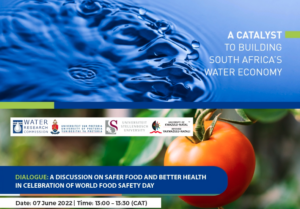Time: 13:00 - 13:30
Venue: Zoom

World Food Safety Day is an annual celebration to draw attention to and inspire action to help prevent, detect and manage foodborne risks. In this dialogue, the WRC and its partners will discuss the areas of concern in food safety, including microbial quality and prevalence of multidrug-resistant pathogenic bacteria in fresh, minimally processed and ready-to-eat (RTE) vegetables from the farm, through processing (washing, cutting, packaging) to the retail level in both the formal and informal sector.
There is evidence that fresh produce may be contaminated with human pathogens, including multidrug-resistant bacteria (MDRB) at various points along the farm-to-market supply chain. Thus, South Africa urgently needs microbiological quality guidelines and regulatory systems to establish more effective control and intervention measures for water, irrigated fresh produce quality and safety assurance in informal supply chains. An integrated surveillance system will need to be established in the longer term to create a knowledge base with regard to emerging challenges including MDRB.
Aim: The aim of this discussion is to highlight the work that the WRC and its partners have undertaken to determine the link between water pollution and crop contamination, and sources microbial contamination, and assess the impact thereof on food safety.
Event details
Date: 7 June, 2022
Time: 13:00
Click here to register. After registering, you will receive a confirmation email containing information about joining the meeting.
WRC report no. 2706/1/21: Measurement of water pollution determining the sources and changes of microbial contamination and impact on food safety from farming to retail level for fresh vegetables
Upcoming Events
Our GOALS
We recognise that producers, processors, distributors and consumers are incorporated into the food system under varying terms and returns. We also recognise the economic, social, human and environmental health impacts associated with food security. Therefore our goal is to conduct research, build capacity and disseminate findings that will promote a sustainable food system in South Africa.
Our MISSION
Our research is concerned with the scale, nature, causes and consequences of food insecurity in South Africa and elsewhere on the African continent. Thus our mission is to investigate products, technologies, processes and policies that can reduce food insecurity and mitigate its negative outcomes. We seek to make a difference to food security by linking innovative science with critical enquiry.



